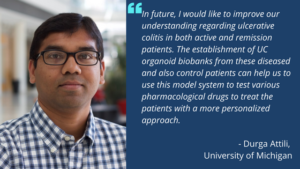Molecular biologist Attili has been a lead researcher and developer of organoids, which are tiny, self-organized three-dimensional tissue cultures derived from stem cells. Organoids have fundamentally opened up a brand new perspective and lens on disease and development, as well as medical treatment.

These stem cell cultures can be crafted to replicate much of the complexity of an organ, or to express certain aspects and functions of the organ. According to the Harvard Stem Cell Institute, “This way of culturing tissues [gives] scientists a detailed view of how organs form and grow, providing them with new insights on human development and disease as well as giving them the opportunity to see how drugs interact with these “mini-organs”.”
Having first joined the Research Lab Specialist team at the University of Michigan in September of 2014, Attili is best known for the development of the isolation method of normal human colon and adenoma LGR5 positive stem cells using MACS and FACS, as well as the development of methods to establish organoid cultures from cryopreserved biopsy tissue. On a global scale, Attili’s contribution to biobanks is revolutionizing the field of drug discovery and opening new approaches to personalized medicine.
Click to read more.
